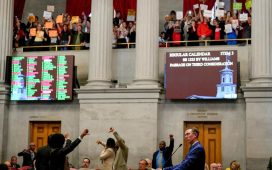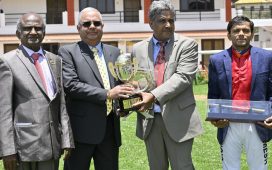In the wake of announcements from The Stronach Group, the New York Racing Association, and Del Mar Thoroughbred Club that Hall of Fame trainer Jerry Hollendorfer would be denied stalls and entries at their facilities, readers have been asking – is this even legal?
After all, Hollendorfer’s license from the California Horse Racing Board was not suspended and he is not currently serving any penalties from the regulatory body. Court documents revealed Del Mar’s reasoning for excluding him lay in fears about public relations rather than any actual allegations of wrongdoing – leading many to wonder how Hollendorfer is supposed to get due process and whether his rights have been violated.
Friday, a judge granted a preliminary injunction in a civil case between Hollendorfer and the California Thoroughbred Trainers against Del Mar, allowing the trainer to return to work there. But it seems unlikely the legal battle is close to being finished; all three parties were ordered into arbitration and attorneys hinted that legal action against Santa Anita may be next.
Readers are not alone in their curiosity about how this situation will play out – equine lawyers around the country are keeping a close eye on the situation.
“The exclusion of licensees is a rare occurrence, particularly when there’s no regulatory action that’s been taken,” said attorney Alan Foreman, chairman and CEO of the Thoroughbred Horsemen’s Association. “What typically happens is the track will have a conversation with the individual and say, ‘Take your horses and go elsewhere. We’ll keep it quiet.’
“And it rippled through the industry; it isn’t just the horsemen who seem to be upset about it. It really rippled through the Maryland racing community. It’s alarmed people.”
Historically, if a track excludes someone and is taken to court, it will assert the facility is private property and therefore is legally allowed to ban someone from its grounds without explanation, for any reason. Most exclusions fall into two categories: those of patrons who are considered “undesirables” and those of licensees.
The origin of the term “undesirable” is foggy, but it has most commonly been applied to patrons track officials suspect of engaging in illegal activity, usually bookmaking or allegations of race-fixing. 1947, the case Madden v. Queens County Jockey Club took issue with the exclusion of a “Coley” Madden, mistaken for another man called “Owney” Madden, who had been identified as a bookmaker. Coley Madden argued first that he was a different person and secondly, the track wasn’t permitted to prevent a paying customer from coming in. Aqueduct claimed it could, and judges agreed, specifying that a track operator can do so “without reason or sufficient excuse.”
“In our opinion (the track operator) can,” concluded the order from the Court of Appeals of New York. “He has the power to admit as spectators only those whom he may select, and to exclude others solely of his own volition, as long as the exclusion is not founded on race, creed, color or national origin.”

California-based Hall of Fame trainer Jerry Hollendorfer
But in 1981, an appeals court in Kentucky overturned a lower court’s finding that Churchill Downs could exclude undesirable patrons from the track. Churchill had cited a portion of Kentucky law which referred to the “Commonwealth of Kentucky” and its ability to exclude undesirables, and appellate judges stated this gave exclusion authority not to racetrack operators, but to the racing commission.
By and large though, attorneys consider that the courts mostly side with racetracks when it comes to their ability to exclude non-licensed patrons. Of course, Hollendorfer has no previous convictions as a bookmaker and unless the racetracks know some major gossip they’re not sharing, he isn’t rumored to be one, either. He’s a licensee, and therefore the legal circumstances surrounding a denial of his access to stalls or to track grounds are different.
Foreman said the exclusion of a licensee fits into one of several categories, depending upon what state/track combination is at play.
Tracks are likely to have a ban challenged if their operator could reasonably be said to have a monopoly over racing in the area. In Maryland, both tracks are operated by The Stronach Group, and in New York, all Thoroughbred tracks but Finger Lakes upstate fall under the jurisdiction of the New York Racing Association. For many judges, that could be successfully argued as a monopoly over racing in those places.
NYRA is an example of another circumstance: if a licensee can make a reasonable argument that a track and a commission (and therefore, state government) are too closely linked, then the track can’t exclude the licensee without a hearing because governments aren’t permitted to take regulatory action without due process. Previous cases have suggested NYRA’s close relationship with New York State makes it a state actor. Monmouth Park was owned by the state of New Jersey at one point and would have fallen into the same category.
Foreman cited a case from the early 1980s between trainer Nikitas Lemberos and Laurel Park, Maryland Jockey Club and others. When Lemberos was told by the track he was no longer welcome there, he evidently moved his horses into the receiving barn and refused to leave. The track sent the stewards out to reason with him, and they eventually told him he was required to leave. A Maryland District court later ruled that because the stewards, who represented the commission, worked with the track to exclude him, his exclusion was a state action and as such a hearing should have taken place.

Alan Foreman
Alan Pincus, Pennsylvania-based attorney who specializes in equine law, says tracks and states can also be considered closely connected if they have what’s termed as a symbiotic relationship.
“In the old days, the track was just an entity to be regulated by the state like other entities,” said Pincus. “Since the state is just a regulator and there’s no other connection between them, the track has independence. Then they started to have lotteries and slot machines and other things at the track where the state was a virtual partner with them in those activities.”
Another situation is that of Southern California, where there is a contract between the local horseman’s association and the racetrack to allow racing and simulcasting to take place. That agreement spells out certain rights to members of the horsemen’s association. Hollendorfer’s legal team and lawyers for the California Thoroughbred Trainers took the Del Mar Thoroughbred Club to court in San Diego last week based on such a contract.
“This case is different than most of the published decisions,” said Darrell Vienna, who represented the CTT in the Del Mar action. “The CTT entered an agreement with Del Mar Thoroughbred Club which I believe constitutes a partial waiver of private property rights by agreeing that no licensee or applicant for participation in the Del Mar meeting can be limited or excluded without agreement with the horsemen.
“Del Mar claims that section of the race agreement doesn’t apply because it has the word ‘discriminate’ and their interpretation of the word ‘discriminate’ is one of basic civil right action and that’s not the case here.”
In one section, the race agreement states that a CTT member may not be excluded without a meeting of the CTT, the trainer, and the track to arbitrate (or if the parties can’t agree, the California Horse Racing Board may appoint an arbitrator). It also states a CTT member can only be excluded with the agreement of the CTT, a provision reserved for rogue actors.
“I think this gets lost on people, but the horsemen want the bad apples out, too,” said Foreman. “This is not a question of trying to protect people who don’t belong on the track. This is a situation of it doesn’t hurt to have people know what’s going on before they get thrown out.”
In fact, Hollendorfer isn’t even the primary party in the case against Del Mar, which means he doesn’t have to explain why he, as an individual, should be permitted to participate. He is represented by the CTT, and it is the CTT whose agreement has been violated, Vienna pointed out.
Vienna said Santa Anita has “an identical” contract with the CTT, which also requires explanation or agreement from members before excluding a trainer. The Thoroughbred Owners of California has similar language in its agreements with the track.
Del Mar has claimed the track’s stall agreement, signed by every trainer, states its decisions regarding exclusion are final and not subject to appeal. Vienna said that assertion falls in direct conflict with the race agreement, and the race agreement contains language stating that in the event of a conflict, the agreement trumps all else.
Those stall agreements, often home to additional house rules such as anti-slaughter policies, are a problem for Pincus.
“They’ve allowed this to happen by having such a weak stall agreement. They’ve allowed it to happen by sitting back and saying ‘They won’t throw you out unless you do something wrong.’ Horsemen have got to stop thinking of stall space as a gift. It’s not a gift. They’re coming there to make a program go,” said Pincus. “Any of these problems could be cured if there were horsemen’s groups that really fought for their clientele. If they have a collective bargaining agreement that has to be signed, they could put in some kind of review process so that a totally innocent person isn’t kicked off. They have failed to do so.”
In some places, such as West Virginia, it is written into the state rule book that a track must grant a licensee a hearing before excluding them, and if the licensee is dissatisfied with the hearing, they may appeal to the state racing commission.
For Pincus, the prospect of tracks making decisions about who can and can’t race raises questions about the purpose of racing commissions.
“Let’s say I went to the commission and applied for a license and they say I’m good to go,” said Pincus. “If you give a track veto power over that, you’re abrogating the responsibility of licensing over to the racetrack. It doesn’t matter whether I, as the commission, want someone to participate or not, they have final say. And final say without a hearing, final say without having to provide an explanation at all. And that’s what we’re fighting against.”
New to the Paulick Report? Click here to sign up for our daily email newsletter to keep up on this and other stories happening in the Thoroughbred industry.
Copyright © 2019 Paulick Report.








